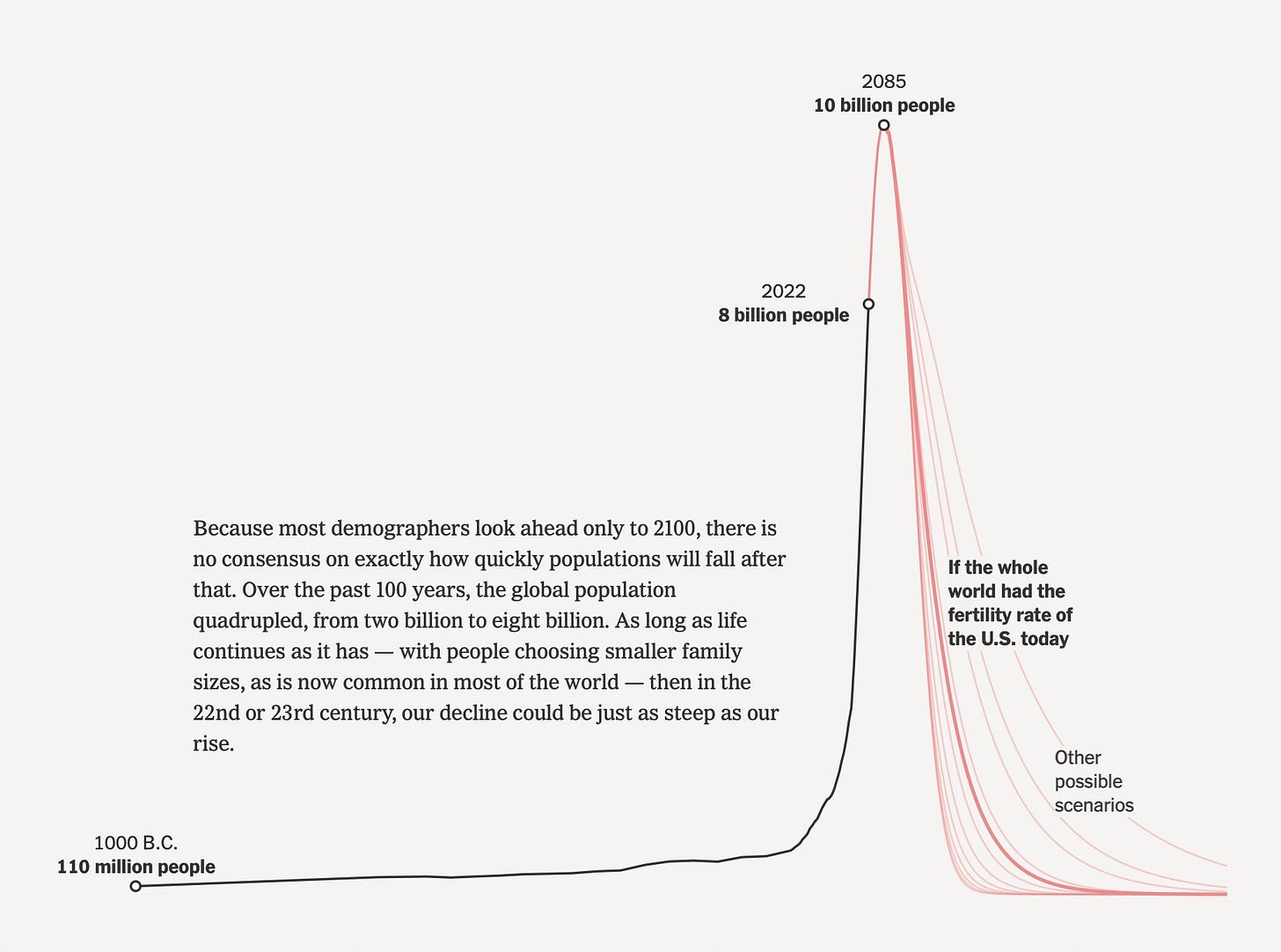Fertility is collapsing. Should we be worried?
Yep, but not for the reasons Elon and the TERFs would have us
I promised a week or two ago that I’d write a post on this new bubbling crisis after months of following various expressions of it.
I’ve looked at how conservatives have caught on to the fact women are not wanting to procreate so much anymore, all the things given, and think they (women) should just get over themselves, their politics and their feminist commitment, and mate already.
I’ve also touched on pro-natalism (a distinctly eugenicist response to the crisis) here and here:
And I’ve written (for many years) on the effects of endocrine disrupting chemicals on fertility (and how microplastics in sperm may have set male fertility rates on a spiral to zero by 2050).
At the core of it all is this:
The world’s fertility rate is dropping below replacement, at exponential speed.
And the ripple-on effect of this is either terrifying or necessary, depending on your slant and the firmness of your grip on the capitalist complex.

What follows now is an overview of Things To Know on the topic. And some perspectives to hopefully help prevent you from descending into yet another tunnel of despair. As with so much today, it is imperative that sensible, compassionate folk like you/us stay on top of such a trigger topic, to ensure it is not co-opted by the far right and the nutters. We need to be on the front foot, prepped to defend principles of humanity. And humanity.
I’d love your thoughts on the various issues I raise. The debate is quite new. There’s plenty of room for fresh takes…
Too many Not enough humans!
I’m guessing: All of us here grew up directly or indirectly freaked out by the prospect of the “population bomb” - an exponential explosion of too many humans for the Earth’s “carrying capacity” that would lead to our collective demise. Paul Ehrlich wrote the book that coined the term in 1968 and it spooked a generation of boomers (and their kids and grandkids).
Before that, back in the late eighteenth century, there was Malhthusianism – the theory that while population growth is exponential, food supply and resources are linear, a line graph scenario that does not end prettily.
Indeed the population has blown out exponentially (mostly) and resources have dried up. We live on a finite planet with the ability to “carry”about one billion people1. Perhaps not coincidentally, this was the population of the world around the time Malthusian set out his theorem and as industrialisation took off. Since we passed this figure, we’ve overstepped six of the nine “planetary boundaries”. A dominant argument in the climate movement has been that we all need to stop procreating to avoid collapse. Although, by “we all”, we (in the West) have tended to mean all those people in Africa and India.
But then, all of a sudden it occurred to the world (or at least the conservative columnists, Silicon Valley, the heterodox feminists and Elon Musk) that a population bust - an exponential dropping off in reproduction - is the crisis to be freaking out about.
Which is existential in its own right, right? It will see humanity, if not actual humans, die out. And will likely lead to a different type of collapse… as well as, no doubt, some dastardly responses from certain quarters as it all goes down.
Margaret Atwood was onto it back in 1986. The Handmaid’s Tale imagined a world in which all but a small number of women are made infertile by 2000. P. D. James’ 1996 book The Children of Men depicted Britain in 2021 in a state of collapse after men suddenly turned infertile. In both tales, the humans (particularly the men) don’t go down quietly.
Here are the stats and talking points, in bullets
It requires a total fertility rate of 2.2 live births on average per woman to maintain replacement (a steady population).
In 1970 the world’s total fertility rate was above 5 live births per woman.
Now two-thirds of us live in a country or area where fertility rates are below replacement level.
Africa still has a total fertility rate of 4.1, but it’s down from nearly double that in the mid-20th century… and, yep, falling. India is already below replacement rate.
The US is at 1.8. Europe is down to 1.6. East Asia 1.2. Australia is at 1.66 and the UK 1.49.
And wait for this:
South Korea’s fertility rate is 0.8 and is currently on track to produce between 4 and 7 great grandchildren for every 100 South Koreans alive today, constituting a 93-96% reduction in population over the course of a century. No plague or war has ever achieved such an extinction rate.
Demographers at the U.N. expect population to peak at roughly 10 billion in 2080. The Wittgenstein Center for Demography and Global Human Capital in Vienna places the peak in the 2070s. The Institute for Health Metrics and Evaluation at the University of Washington puts it in the 2060s

Graph prepared by Dr. Dean Spears, economist at the Population Research Center at the University of Texas, for The New York Times. He works to the UN figures and makes the point: “Humanity will not reach a plateau and then stabilize. It will begin an unprecedented decline.”
OK, so what’s the problem with fertility collapse?
Surely less people solves - in massive part - our resources and emissions issue? And perhaps it will happen in just enough time to save us from full climate collapse?
Surprisingly, I’ve not actually heard anyone discuss it in these terms. Have you? Perhaps it’s not being discussed because it won’t (save us in time)? I’m not sure.
It’s possibly moot anyway because fertility collapse will likely produce another type of collapse sooner than climate collapse.
The argument goes like this: People today are living much longer. So in coming decades there will be more old people about the place, and even more (even older) old people to come down the pipeline.
At exactly the same time, there will be less young people entering adulthood to pay the taxes, make the widgets, to keep the economy going, to become cancer surgeons and golf course groundspeople to maintain all those old people. And to maintain all the infrastructure and systems and gardens and things that we’ve built so earnestly over centuries.
And so the economic and societal structures will begin to collapse.
Brink Lindsey from the Niskanen Institute writes about how low fertility means there are less humans to maintain a society’s status quo, which leads to chaos:
“Whole societies will soon start to melt away. As with our personal ties to each other, our ties to the social order are weakening as well. Trust in virtually all social institutions is in relentless decline.”
💥 Also, once a population’s replacement rate drops below 2.0, it apparently never returns above it. The decline to obscurity is unavoidable.
So have we suddenly just stopped liking kids and sex or something?
Somewhat. But there are actually quite a range of compounding factors that have landed us in this crisis. And, frankly, I am stunned that they have all crept up on us (all at once) and no one saw them coming. But, granted, this (being blind to frog-in-warming-pot scenarios) is a familiar story now.
Here are a few of the reasons I’ve seen put forward:
Endocrine disrupters in our foods, pesticides and herbicides (and perfume!) – so, forever chemicals - have been building up in the soil, our food and in our bodies, and are now said to be reducing female fertility by as much as 40%.
Similarly, plastics in our water are reducing sperm count dramatically. Speculative studies show sperm counts could reach zero by 2045. Average sperm counts among western men have more than halved in the past 40 years.
More contraceptives, more sexual education, more education of women globally. (Given a choice, women generally don’t want eight kids).
Young women and men are increasingly dividing - politically, sociologically and in their online habits. And so they are not meeting. And don’t have much tolerance for each other when they do. I’ve written about this a bit. I just came across this telling statistic in The Economist last week that points to the extent of this drift and its potential connection to fertility standstill:
Nearly 80% of South Korean men in their 20s say that men are discriminated against. Barely 30% of men over 60 agree, making their views indistinguishable from those of women in their 20s or 60s.
The neo-liberal system presents parenthood as a choice that competes among many available to us. It also compels us to tick off a whole bunch of other choices before we have kids (and a certain amount of career status, savings, travel under one’s belt, etc. is deemed required before parenthood is attempted). Which reduces everyone’s available child-producing years. The system has also produced a society that’s not child-rearing conducive (while at the same time imposing the expectation that parenting should be done perfectly), which makes having kids a less attractive choice than many others at the smorgasbord. Ezra Klein covers this in a recent podcast with Jennifer Sciubba, author of “8 Billion and Counting: How Sex, Death and Migration Shape Our World”.
In her book, Sciubba refers to “opting out” by women as a key cause. Young women are sticking two fingers up to the traditional female role. This is happening particularly in Japan and South Korea.
I would also point to the fact that more and more young women (and to a lesser extent young men) are opting out of their sex, which I’ve covered here:
Scuibba also says super low fertility speaks of a world where young people are not optimistic about the future. She told Ezra Klein:
“Having kids is the ultimate faith that the future will be good. And we saw it go low around the time the Soviet Union collapses in Eastern Europe. People feel dismal about the future, and they don’t want to have children.”
Beware the weird-ass collective of interests!
The mind contorts trying to map the various interests that’ve jumped onto this issue. The Silicon Valley crew (Elon, Peter Thiel et al), drawing on the literalist, utilitarian argument of the longtermists, are frothing pro-natalists. The tech bros need us to keep having kids to ensure their technofeudal future plans get to play out.
The Trad Wives2 and TERFS (stands for Trans-Exclusionary Radical Feminists; a conservative movement of women’s groups predominantly based out of the UK)3 are all over it. I follow Louise Perry, author of the controversial bestseller The Case Against the Sexual Revolution, with curiosity. She makes a bi-weekly case over at Maiden Mother Matriarch for women to have more kids. There are also voices like Mary Harrington author of the new book Feminism Against Progress, who coined the term “reactionary feminism”. She and other TERFs argue that birth control and consequence-free casual sex amounts to “pretending to be a man”.
The conservative forces are increasingly targeting this fertility crisis as a cause célèbre. Conveniently they can blame it (and everything they deem to stem from declining birth rates) on women. It also suits their agenda to have women back in the home producing economic units that will keep the growth imperative going. The New York Times columnist David Brooks has recently been exposing his conservative origins, writing extensively about the need for young people (particularly women) to prioritise marriage over career. At the extreme, you have dictatorships like the one in Romania that got rid of contraception and abortion when rates started to dip. And you have the US…
BTW, both Perry and Harrington were invited to speak at last year’s US National Conservative (NatCon) conference.
Largely what unifies these groups is a need to cling to the old structures that are built on the growth imperative. Most of these, as we know from our conversations here, are collapsing in pretty much the same trajectory as population. Here’s a chart that the late Reverand Michael Dowd did up to show this (more on this below):
It replicates what The Limits to Growth report predicted in 1972 - that we would hit peak resources, food, fuel, population etc in the 2020s, with collapse occurring by about 2040. I cover this phenomenon here if this is new to you:
My (warm) take
I think we should be paying as much attention to the causes of this fertility decline as we are to the implications of the decline itself. I’ve said this a number of times: The fact young men and women are just not seeing eye-to-eye is hugely worrying. And the extent to which young men are feeling threatened by calls for women’s equality and upward mobility is terrifying. The Economist last week released the results of a poll of 20 rich countries on this very issue and found that young men were overwhelmingly more anti-feminist than older men (per the South Korean stat above). It’s worth reading the details of their findings.
Relatedly, the extent to which young women are wanting to “opt out” of both their gender and sex, but also out of life and being around men, is also a major issue. Gen Z women, unlike older women, are dramatically more likely than their male peers to describe themselves as LGBT (31% to 16%), as one example. I’ve written about this here.
I also think it’s helpful to view the issue through a complexity or collapse lens. The causes behind fertility decline that I list above fit the sixth stage picture, the Age of Decadence, as spelled out here. The signs include: “Hedonism, cynicism, pessimism, narcissism, consumerism, materialism, nihilism, fatalism, fanatics...” As the German polymath and collapsologist Oswald Spengler wrote in The Decline of the West in 1918:
“When the ordinary thought of a highly cultivated people begins to regard 'having children' as a question of pro's and con's, the great turning point has come”.
But it should be pointed out that the population decline we have come to associate with collapse - climate or otherwise - has been assumed to stem from mass civil unrest (as we fight for dwindling resources, and possibly from AI or nuclear fall-out). The decline would come from deaths, per that Dowd graph above.
But I’m wondering if this fertility drop-off could come to account for the bulk of the plummet required to arrive back at the earth’s carrying capacity? What if we could avert mass death and carnage?
What if the fertility crisis is life, the “universe” (God?), adjusting things to what is required of it (less people on an over-taxed planet) in the most benevolent way possible?
What if comedian George Carlin was right, per his Saving the Planet skit? The meaning of existence is indeed plastic! Humans exist to invent the plastic that kills off the sperm that is required to keep humans from (over)producing…it’s an idea!
What if the collapse that is ahead is a devolution of the growth model, which we see coming because we’re discussing it robustly now and we prepare for it (with haste)? And what if it dials down the climate collapse as it eases pressure on resources and emissions?
And per this conversation the paid community and I had here, what if what is actually collapsing is good?
Finally, I think we (here) have a responsibility to ensure this issue is not, as I said at the top, co-opted and exploited by misogynist, authoritarian, nefarious people and interests that will then impose their will on reproduction and women’s bodies. I mean, it’s already happening in the US. Our efforts would be well put to safeguarding this (as the French have just done).
Like all things collapse, there is not much that can be done to actually avert the downward slide. Indeed, fertility rates remain below 2.0 both where abortion is freely available and where abortion is restricted (a stat worth having on hand for arguments with our right-wing friends). So all this energy being put into pro-natalism and getting young women to mate (with a generation of men who they are increasingly at odds with) is not helpful. And it’s a distraction from the things we need to - and can - fix or heal. Such as, helping young people like each other more and preparing for a world that will - and can - no longer keep growing.
Thoughts?
Sarah xx
PS This week’s Wild episode will land a day late. It’s a special one and has taken a bit of work to produce. Thanks for your patience.
Expert’s figures vary between 1 and 4 billion.
Here’s an explainer of the Trad Wives phenomenon in New Yorker last week.
I’ll be covering TERFs in next week’s podcast.










Thanks for discussing this. I’m a migrant married to an Australian and privileged on every scale. We had two children in the 1990s. It was phenomenally hard and almost killed me. His family were 8 hours drive away, mine a 24 hour flight. The most wonderful thing was a community crèche with extremely intelligent, caring and creative staff. They were paid a pittance and were being defunded by state and federal governments. The implication is that raising kids is just what happens (it doesn’t, they have developmental needs and loving carers and community is vital). Also that caring for others is not the business of important work and so financial and other support is seen as a safety net for the weak. Decades of neoliberalism has made us believe that money is what matters. Money gives you the power to receive and dominate without being either inclusive or belonging. We do need joy, and play and a deep appreciation for the complexity of life. The economic system, and the emotional underpinnings of extraction and control, have hollowed out our people. The plastic crisis (and all the others) have been made and intensified for decades. To stop them would require a rebuilding of care for the earth and a redistribution of power and wealth. It’s not going to happen while money buys immunity and the ability to ignore or destroy via powerful institutions and beliefs.
So many sides covered so well here, Sarah. And I agree with your conclusion. It's kind of all moot. Fertility is going to be the least of our problems in the coming years. And I also feel (know?) that the universe/God/a higher intelligence is really at play here. We can philosophize and opine about it, but births are just going to continue to decline. The real scary part, I feel, is how society is treating the scapegoat -- primarily women and girls. How will that continue to play out as collapse continues?